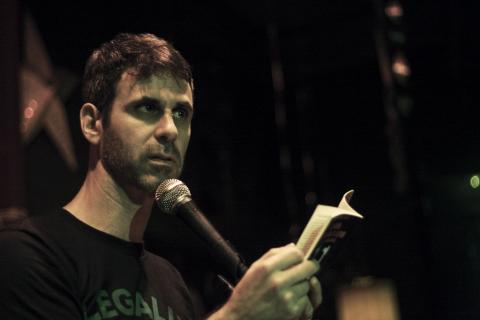
You don't know this about me, but I love Broadway. I love musicals and dramas and the Tony Awards. It is the only awards show I look forward to each year. You can keep your Oscars, your Emmys, your Grammys; my heart belongs to Broadway. There are not many men who could entice me to miss the annual spectacle of big, flashy dance numbers, but your LitFest workshop (Can I Write That?) was scheduled to coincide with the opening number. It was a tough decision: take your workshop or spend a few hours watching Hugh Jackman ham it up with the cast of "Hedwig and the Angry Inch."
Oh, who am I kidding? Steve, I'll take you over Hugh Jackman any day of the week.
I know we promised not to share anything from that workshop, because the pieces that were written and read aloud were so personal, so raw, so taboo, that a measure of anonymity was required to free us up for sharing anything at all. So I won't share any damning details, but I will share the assignment and one piece of advice for all the writers out there who missed your excellent workshop.
- Assignment: Write something that would upset your mother.
- Advice: If anybody gives you any shit about it, blame Steve Almond. (Would Hugh Jackman do this for you? He would not.)
That's it. That's all I can say about that particular workshop in this particular forum, but fortunately for me I also took your Riveting Scenes workshop on Saturday. I want to thank you for the following nuggets of wisdom that promise to make my scenes more riveting in the future.
- Scenes fail because the author fails to inform the reader of the emotional stakes. (Of course. Of course this is true. Of course it makes no sense to just plop a reader down in the middle of a scene with no insight as to why the character might be changed by the events of that scene. Of course. This is so obvious and yet I race to get to the action. I'm all "show don't tell" and feeling so superior about it, but you are right when you say, "Tell a little bit, then show." You are right an awful lot of the time. I suspect you are right far more often than Hugh Jackman is right.)
- When you feel like racing through a scene, slow down. (Right again! How did you know that I want to race through the hard parts? That I tend to gloss over the really painful moments? I'll bet Hugh Jackman doesn't know that about me.)
- Show only the moments that matter. (Right, yes, I know this, and yet I'm constantly showing insignificant action for no reason but to get a character from one room to another. Egads! If I were writing a Broadway play, it would be six hours long and nothing would happen. Hugh Jackman would not perform in that play, I suspect.)
You gave us so much good information that I've been itching to write and write some more (damn my day job!), but you have that effect on me. Last year at Lit Fest, you talked about the importance of a strong narrator and I, in the midst of a hellish novel revision, experienced a revelation that sent my revision off on a new path. Before your workshop, I was slogging along and complaining bitterly about how I just couldn't make the novel work until everyone I encountered likely wished I would just burn the damn thing and quit writing altogether. But then, after a few hours in your excellent workshop, I found that I was excited about the revision. Suddenly, I knew what I needed to do. And, lo and behold, it was the right thing. My agent liked it, and then she sold it. To an actual editor. At an actual publishing house. In New York City, birthplace of Broadway. Take that, Hugh Jackman.
Is it possible, Steve Almond, that you are magic? If I wrote a play about you, do you think Hugh Jackman could capture the magic that is Steve Almond? Frankly, I'm not so sure, but I'll bet he'd like to try.
I'll sign off before this letter becomes awkward. (What, too late?)
Your humble student,
Tiffany
P.S. Please come back again soon. I miss you already.


